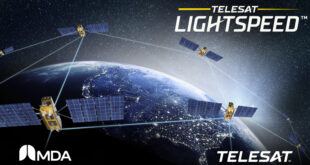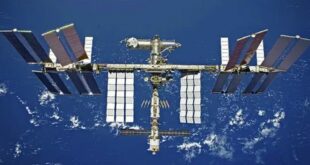
By Jessica West and Gilles Doucet
When we consider the norms that govern human use of outer space from the perspective of space security, we face some serious questions. How do we think that this body of rules and accepted behaviours and attitudes—this normative landscape—can be strengthened and extended to fill in critical gaps, particularly in relation to military and security activities? What tools would encourage responsible behaviour to become the norm? What would a future governed by the best possible assembly of norms look like?
We hope to approach answers to these and other questions in our research project on norms in space, which is funded by a policy-focused research grant from the Mobilizing Insights in Defence and Security (MINDS) program of the Canadian Department of National Defence. Our goal is to generate an understanding of how existing and emerging norms of responsible behaviour in outer space—many of which relate to safety and sustainability and were developed by the civil and commercial sectors—might be applied to space-based security activities and norms.
As part of this project, we have created a survey that we are asking space experts from around the world and from varying professional background to complete. We trust that this group will provide us with diverse perspectives and new insights into prevailing normative behaviours, and will generate additional ideas that we can pursue in the next phase of our work.
Why are we doing this work?
Specialists in space security are constantly calling for more robust norms of behaviour in outer space. As the number of users and uses of space grows and geopolitical competition intensifies, the calls get louder and more urgent.
The call from those involved in defence diplomacy is particularly acute, given the lack of progress in addressing the increasing tensions in outer space. There are many calls for norms, but few concrete actions. Canada’s national defence policy, “Strong, Secure, Engaged,” contains the commitment to “provide leadership in shaping international norms for responsible behaviour in space.” Our project is tapping into this objective, which is shared by many states.
Achieving such norms would benefit everyone in the global community. The recent and ongoing drive to strengthen norms related to safety and sustainability in outer space can model an approach to achieving comparable norms for international security. Although not a replacement for concrete arms control measures, identifying and promoting norms of responsible military behaviour in space can begin to reduce the threat environment in outer space by making it easier for everyone to distinguish and identify potentially harmful or escalatory activities, thereby diminishing the incentive for certain actors to pursue such actions.
Years of rhetoric in support of the development of norms has not resulted in specific initiatives. So, how do we move forward? Our answer: begin with what is already in place.
How are we doing this work?
By mapping the contours of the existing normative landscape, we can get a sense of what the uncharted territory might look like. Thus, the act of mapping can suggest relevant and achievable practices for responsible behaviour in space for military and security actors and activities.
In the first stage of our research, we analysed a broad collection of documents that have informed space activities over the last 50 years, including treaties, bilateral agreements, national laws, adopted guidelines and voluntary measures, proposals for new voluntary or legal measures, and international technical standards. We looked for evidence of what counts as acceptable or expected behaviour in outer space—in other words, for norms of behaviour. Using qualitative research software, we coded and categorized our findings according to the values and purposes that they uphold, the activities involved, the behaviours identified, and the supporting mechanisms and tools.
This process generated a lot of data and indicated several patterns. But norms are more than a data point: they reside in our collective understandings, expectations, and practices. The survey is intended to help us to tap into this communal knowledge.
What do we hope to achieve?
We hope that the survey will facilitate collaborative knowledge development within the global community of experts on outer space to better identify and reflect diverse and shared experiences. We hope that the survey will help us to identify possible normative expectations that we have missed. We also want to use it to start our thinking on how to extend our present roadmap to link practices associated with safety and sustainability with those more firmly rooted in military security. The survey also provides an opportunity to look for evidence of emerging norms—behaviours that are practised but not yet formally acknowledged.
The survey data will give us a new perspective on the work we have done so far; we hope that survey responses will both reinforce some of our ideas and suggest new ones that we can pursue. The survey will be followed by a second round of discussions with expert consultants. Results from all these sources will be wrapped into our final report and normative map, both of which will be made public in an effort to contribute to the global conversations now taking place.
Overall this is an opportunity for the global space security community to think collectively about the current governance situation, the changes that are possible, and that paths that can be used to strengthen the norms that guide behaviour in outer space.
AN INVITATION TO PARTICIPATE:
If you are a professional engaged in a space activity or program with a specialty in technology, policy, law, or civil, commercial, or military operations, our project would like to hear you views on norms of behaviour in outer space. You can share them with us via the survey link below.
While this project is funded through a grant provided by the Mobilizing Insights in Defence and Security (MINDS) program of the Canadian Department of National Defence, research is being conducted independently. All respondents are expected to comment in a personal capacity, and the researchers are not seeking classified or government info, etc. All responses to the survey are anonymous; they will be accessed exclusively by the two project researchers:
* Jessica West, Project Ploughshares
* Gilles Doucet, Spectrum Space Security
The survey is open for participation until Sunday 9 June, 2020. Please click on this link to access the survey.
The survey includes a number of open-ended questions. Depending on the length of your responses, it could take up to 45 minutes to complete. We are grateful for any information and insights that you can contribute.
Additional questions or comments? Contact Jessica West: [email protected].

Jessica West, PhD, is a Senior Researcher at Canadian peace research institute Project Ploughshares and Managing Editor of the Space Security Index annual publication. Her research and policy work is focused on technology, security, and governance. She holds a PhD in global governance and international security from the Balsillie School of International Affairs, Wilfrid Laurier University where she worked on the confluence of military and medical modes of containment and resilience.

Gilles Doucet is an independent space security consultant and President of Spectrum Space Security Inc. Doucet’s consultancy focuses on the convergence of satellite technology, space governance and international space security cooperation. Doucet is Technical Lead of the drafting committee for the Manual on International Law Applicable to Military Uses of Outer Space (MILAMOS). Doucet also instructs in satellite and space security at the Cybersecurity LLM program at St. Thomas University School of Law. Prior to founding Spectrum Security Inc., Mr. Doucet spent 35 years as a research scientist with the Canadian Department of National Defence conducting studies and assessments on space technology, military applications, and advising on space policy, international cooperation, and defence diplomacy.
 SpaceWatch.Global An independent perspective on space
SpaceWatch.Global An independent perspective on space




